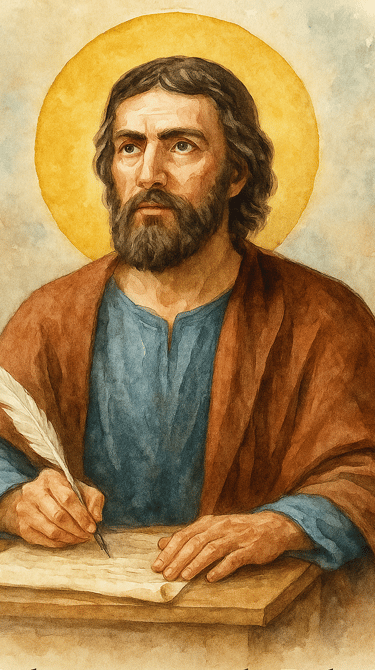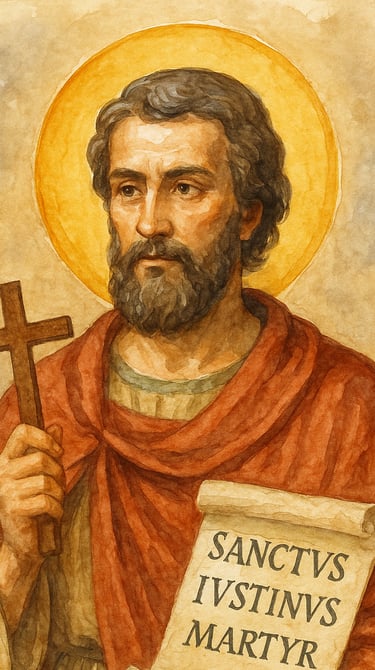St. Justin Martyr (c. 100–165 AD)
Philosopher of Christ, Defender of the Eucharist
Halo & Light Studios
6/2/20253 min read


Click link for a reel of Daily Dose of Saints and Faithful Art:
https://youtube.com/shorts/nzfKSyh-Xic?si=fSU94MdGHkwV_WHZ
“We do not consume the Eucharist as common bread or common drink. But as Jesus Christ our Savior, made flesh by the Word of God.”
— St. Justin Martyr, First Apology, c. 155 AD
St. Justin Martyr (c. 100–165 AD) stands as a towering figure in the early Church—one of her first great apologists and one of her most fearless witnesses. Born in Flavia Neapolis (modern-day Nablus, Palestine), Justin was a passionate seeker of truth. He explored Stoicism, Pythagoreanism, and Platonism in his quest to understand the meaning of life. Yet none of these satisfied his heart until he encountered the Gospel and found in Jesus Christ the fullness of truth itself. The Logos he had once sought as a philosopher, he now worshiped as the Incarnate Word of God.
After his conversion, Justin traveled to Rome, where he opened a school of Christian philosophy and engaged in open dialogue with both pagans and Jews. He saw Christianity not as the rejection of reason, but as its fulfillment—truth illumined by divine revelation.
His writings, especially the First Apology, Second Apology, and Dialogue with Trypho, are monumental contributions to early Christian theology. In them, he defended doctrines that remain foundational to the Catholic faith today: the Trinity, the moral teachings of the Church, and most notably, the Eucharist.
The Eucharist: Source and Summit of Christian Life
In Justin’s writings, we find the earliest surviving description of the Mass. He makes it unmistakably clear that Christians of the second century believed in the Real Presence of Christ in the Eucharist: “We have been taught that the food...is the flesh and blood of that Jesus who was made flesh.”
This teaching is not symbolic, poetic, or metaphorical—it is literal and incarnational. What Justin proclaimed with clarity, the Church has consistently taught for 2,000 years. As the Catechism of the Catholic Church declares: “The Eucharist is 'the source and summit of the Christian life.'” (CCC 1324)
In this Most Blessed Sacrament, we receive not merely a symbol, but Jesus Himself—Body, Blood, Soul, and Divinity. The same Christ who walked the earth, suffered, died, and rose again—comes to us, humbly and wholly, in the form of consecrated bread and wine. As Padre Pio once said: “It would be easier for the earth to exist without the sun than without the Holy Eucharist.”
And St. Justin understood this—perhaps better than anyone in his era. He knew that Christianity without the Eucharist is like a body without breath. The Eucharist is not optional for the faithful—it is the greatest gift God has given to man.
A Call to Our Separated Brethren
To our Protestant brothers and sisters, we say this with deep love and sincerity: If you have not yet encountered Christ in the Most Holy Eucharist, you are missing the heart of the Christian mystery.
The Jesus you know and love longs to give Himself to you—not only spiritually, but sacramentally. His Body given up. His Blood poured out. This is the same Eucharist celebrated since the days of the apostles and defended by saints like Justin, who shed their blood so that this truth might be preserved.
Come, join the feast. Come to the altar of the Lord. Believe in the miraculous reality that by the words of consecration, the bread and wine become the true Body and Blood of Christ. As St. Maximilian Kolbe beautifully said: “If angels could be jealous of men, it would be for one reason: the Holy Eucharist.”
In the Eucharist, the whole Church is united as one Mystical Body, with Christ as our Head. Heaven and earth are joined. The saints and angels gather with us. And we are never closer to God on this side of eternity than in that moment of Holy Communion.
The Martyr's Crown and the Philosopher’s Witness
Justin was eventually arrested for refusing to sacrifice to the Roman gods. When told that he would be tortured and killed, he responded with words that echo through the ages: “No one in his right mind gives up truth for falsehood.” He and his companions were scourged and beheaded under Emperor Marcus Aurelius around 165 AD.
Today, St. Justin Martyr is honored as a patron of philosophers, apologists, and seekers of truth. His writings remain a cornerstone of Catholic thought and an enduring defense of the Holy Eucharist as the living heart of the Church.


